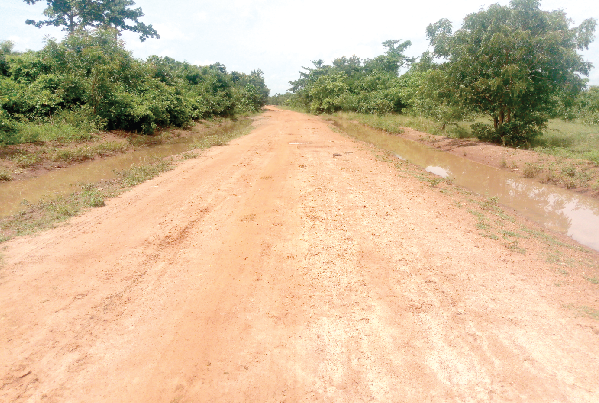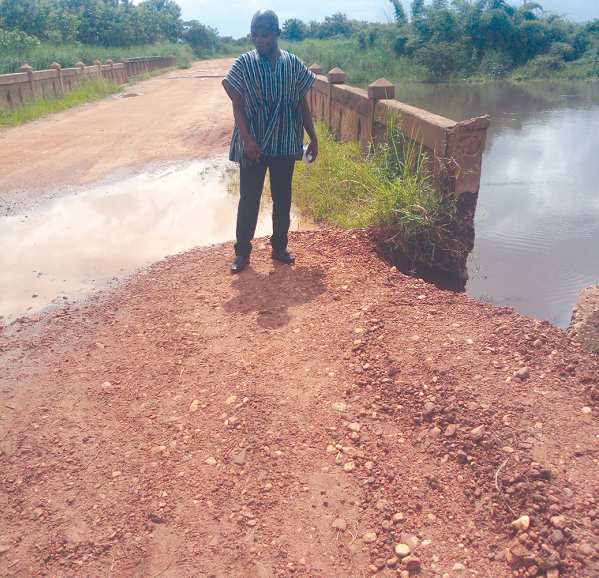
Adaklu: A district with no tarred roads
Adaklu District in the Volta Region was created on June 18, 2012, under President Evans Atta Mills following disagreements arising from the siting of the district capital for the new Adaklu-Anyigbe District which was created for the people of Agotime, Ziope and Adaklu traditional areas.
Advertisement
Location
Several demonstrations were staged, including a warrior street march by the people of Adaklu in Ho, the regional capital, to show their displeasure at choosing Kpetoe as the district capital.
Consequently, President Mills went through the relevant processes to declare the creation of the Adaklu District out of the Adaklu–Anyigbe District as an independent entity to resolve the crisis.
Today, the Adaklu District, located
It is located off the east of the Ho-Adidome road and off the south of the Ho–Aflao highway with an inroad at Akwetteh, near Agotime Kpetoe, and inhabited by more than 55,000 people mostly engaged in subsistence farming, with a few enclaves of herdsmen.
91 communities/homogenous settlement
The Adaklu District has 91 communities and is a settlement that is homogenous in character in the sense that it has one paramount chief overseeing the entire traditional area, which is also coterminous with political demarcation, the Adaklu Constituency.
No tarred road
Unfortunately, the Adaklu District or the traditional area or the constituency has no tarred road, which is a bane to development, especially in connection with the promotion of inter-district trade among five districts that share boundaries with it.
The roads are seasonally inundated with floods caused by River Tordzie which winds across two bridges, making the roads inaccessible and causing destruction to lives and food crops.

The Adaklu DCE on one of the endangered bridges
Dynamics of times
The District Chief Executive (DCE), Mr Kadey Donkor, said there was an urgent need to open up the area by constructing at least one tarred road to the district capital at Waya, stressing that all the bridges spanning the river were constructed by the Germans in 1937 and had outlived the dynamics of those times.
He specifically called on the Ghana Highway Authority (GHA) to construct new bridges, one to link Waya and Adaklu –Kpodzi and Akatsi-North and another one to link
He further called for another bridge to connect Kodzobi and Dzakpo, adding that without those facilities farmers were disconnected and prevented from trading their crops at marketing centres in the harvesting season.
Education/banking
On education, Mr Donkor said the district had 27 junior high schools and one senior high school, with a contractor yet to complete a new senior high school project initiated under the Mahama regime.
He added that the challenge teachers in the area faced was that many of them resided in Ho and commuted daily to Adaklu to deliver their services, leading to lateness to school and low output in school results.
He, therefore, appealed to non-governmental organisations (NGOs) to complement the efforts of the government and the district assembly by putting up accommodation for teachers to enable them to stay in the district.
Banking facilities are also not many because it is only the GN Bank that is available to serve 91 communities with over 55,000 inhabitants.
Adaklu has a limited source of potable water as the people depend on untreated water from River Tordzie and the Kalakpa stream for drinking and domestic uses.
Water project
A few of the communities, however, have mechanised and manual boreholes. The DCE, therefore, appealed for connection to the Adidome water system.
He indicated that there was an ongoing water project sponsored by the Spanish government to provide mechanised boreholes for nine communities.
Adaklu District is serviced by 11 Community Health and Planning Services (CHPS) compounds because it has no clinic, no health centre, no hospital and has always referred patients to Ho or Adidome.
Apart from subsistence farming, the people are at risk of creating the first inland desert in the country due to the excessive harvesting of trees for firewood.
The people are generally unhappy about the low level of infrastructure development and have called on the government to
Miss Patience Teli, a 35-year-old farmer, says the people are saddled with bad roads that lead to the district capital so the expected growth of a market at Waya has been stifled and farmers income has been affected because they cannot cart their produce to the market to promote inter-district trade with adjoining districts.



